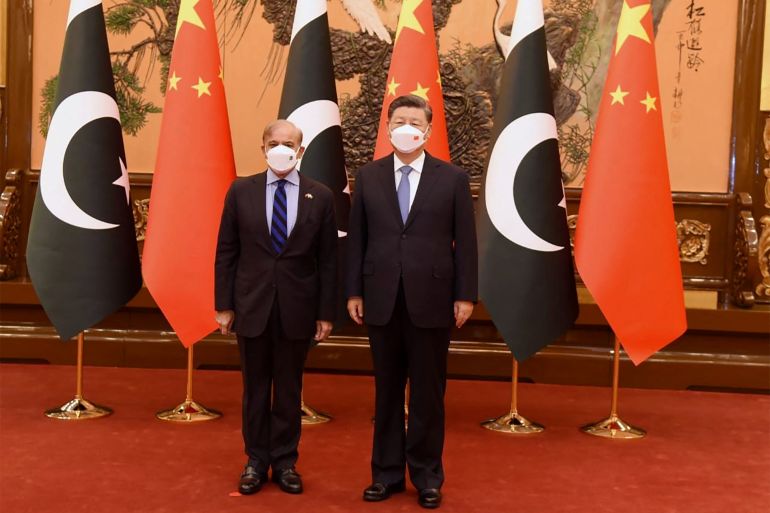Pakistan is making a mistake in ignoring the US for China
Pakistan has long juggled ties with China and the US successfully. It’s open turn towards Beijing risks ending that.

In March, the United States co-hosted the second virtual Democracy Summit with more than 120 countries represented. Pakistan declined an invitation to attend, saying instead that it would pursue one-on-one dialogue with the US and other nations that participated in the summit.
Pakistan’s decision reportedly stemmed in part from the US move to include Taiwan in the meeting while keeping China out. Beijing views Taiwan as a part of China. Both Pakistan and the US uphold the one-China policy and don’t recognise Taiwan as an independent nation.
Keep reading
list of 4 itemsThe Take: After Iran struck Israel, how did Jordan and Lebanon react?
Photos: India’s Gen Z voters want jobs, harmony in world’s biggest election
Georgia advances ‘foreign agents’ bill as 20,000 rally against it
While Islamabad chose not to attend the US-led Democracy Summit, its representatives attended the International Forum on Democracy: Shared Human Values in Beijing and the Boao Forum for Asia on the Chinese island of Hainan just a week earlier.
Its attendance record marks a break from a careful diplomatic balance that Pakistan has long tried to maintain in its relations between the US and China.
In the past, Pakistani leaders have frequently offered to mediate between Washington and Beijing as they did in 1971, when leaders of the US and China moved away from decades of deep mistrust to forge a relationship. The credibility that allowed Pakistan to help the two powers communicate came from its artful diplomacy over several decades.
In 1954, when Pakistan joined the US-led security alliance, the Southeast Asia Treaty Organization (SEATO), it ensured that the agreement did not explicitly mention Chinese communism. Prior to participating in the first SEATO conference, the Pakistani ambassador met with Chinese officials in Beijing to assure them of Islamabad’s commitment to maintaining “happy and harmonious” ties.
At the African-Asian conference in Bandung in 1955, Pakistani Prime Minister Muhammad Ali Bogra reiterated Pakistan’s position to his Chinese counterpart, Zhou Enlai, that its alliance with the US was not anti-China but rather aimed against India. Beijing recognised Pakistan’s stance and directed criticism at the United States, choosing not to oppose Pakistan’s membership in the US-led security alliances.
Then, as Sino-Pakistani military ties grew stronger after China’s border war with India in 1962 and its support of Pakistan during the latter’s war with India in 1965, Pakistan ensured that its alliance with China did not threaten American interests in the Asia-Pacific region.
Pakistan refrained from backing China’s demand that the US withdraw its forces from Vietnam and other parts of the region. At the same time, it has consistently supported the one-China policy, refusing to recognise Taiwan as an independent nation.
This pragmatic, flexible and somewhat independent approach allowed the country to act as a bridge between Washington and Beijing in 1971. But by refusing to attend multilateral political dialogues in Washington while showing up in China for similar discussions, Islamabad is carrying out a pivot that could restrict its ability to navigate the US-China strategic rivalry.
At the democracy forum in Beijing, Mushahid Hussain Sayed, chairman of Pakistan’s Senate Committee on Defence, praised China’s “democratic” system for reducing poverty and criticised the “so-called” US Democracy Summit for weaponising democracy and human rights.
Meanwhile, former National Security Adviser Moeed Yusuf spoke at the Boao Forum, calling for the US and China to collaborate on addressing global challenges like climate change and debt distress without engaging in power politics. Given Pakistan’s significant debt to China (about 30 percent of its overall $100bn external debt) and the lack of agreement between China and the Paris Club of major lending nations on a mechanism to reform the global lending structure, Yusuf’s message made sense.
Pakistan could have carried this discussion forward by sending its representatives to the US Democracy Summit and calling for mechanisms to provide solutions to climate- and debt-vulnerable countries. Islamabad needs to register concerns at both powers’ forums, urging them to cooperate on debt restructuring for countries facing debt distress and on financing climate-adaptive infrastructure in countries like Pakistan.
If Pakistan disagreed with any of the paragraphs in the US summit’s declaration, it could have expressed its reservations. Twelve of the 74 countries that endorsed the declaration – including India, Israel, the Philippines, Mexico and Poland – expressed reservations or disassociated themselves from some of the paragraphs.
For instance, India expressed opposition to three paragraphs related to the rule of law, the International Criminal Court and internet restrictions. Pakistan had the opportunity to similarly disassociate itself from paragraphs it considered contrary to its national interests or not reflective of its views. On top of that, Islamabad could have taken a more constructive approach by presenting its perspective and proposing ways to facilitate democratic debates and improve global approaches on issues that matter to it.
Nighat Dad, a Pakistani digital rights activist, seized the opportunity to share the stage with US Secretary of State Antony Blinken and forcefully advocated for the advancement of democracy and internet freedom in the digital age. She underscored the importance of considering the experiences of marginalised communities, such as female journalists and activists, in global debates on the democratic governance of the internet. Dad emphasised the need to acknowledge the solutions proposed by local communities in the Global South.
Pakistan’s government could have ensured that its voice was heard on platforms organised by both of the world’s two big powers. It should have presented itself as an independent actor that can speak for itself without having to be apologetic or subservient to any power centre.
The views expressed in this article are the author’s own and do not necessarily reflect Al Jazeera’s editorial stance.
